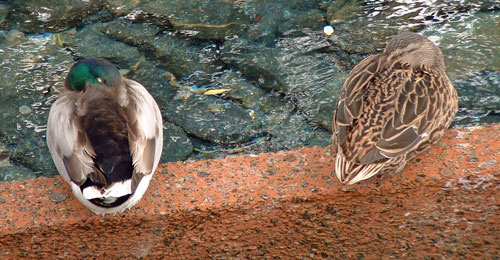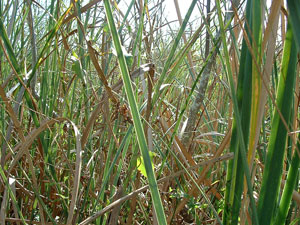Following in the line of my much "admired" and frequently sited "award-winning" "Devotional Reading of H. P. Lovecraft," I present for your delectation and delight and short excursion into In the Court of the Crimson King. Partly this was driven by the discovery of Robert Fripp's magnificent Pie Jesu album, which is apparently a compilation of other bits and pieces. And there are frequent hints throughout his oeuvre of a religious background if not of a religious feeling. Working on the premise that God uses great art often despite the intentions of the artist, I present this consideration of the first song on In the Court of the Crimson King.
I have no idea who composed the lyrics for this song, but as Fripp was always a leader of the group, no matter how many people swirled around it at a time, and considering that the album is a work of musical genius, we can find in it the fingerprint of the Creator. (All one needs to do is squint and look hard enough.) {Also a caveat: I won't pretend that this is a profound musicological understanding of the work as a whole--I haven't the background for that. I work with words, and so it is the interplay of the words and the music that I shall try to look at and open up for you what I see there.)
For our first class let's consider the first song: "21st Century Schizoid Man." For those who have not heard it, it is a rather grating introduction (as befits the subject matter) to a magnificent album. There is a very astringent guitar line with a voice altered in some way to create the sense of growling or screaming. The song proceeds for the first two verses indicated below in a very rigid, tense semi-melodic line--yes, there's a sort of tune to it, though I don't think one would typify it as hummable.
21st Century Schizoid Man
Robert Fripp/Ian McDonald/Greg Lake/Michael Giles/Peter Sinfield
Cat's foot, iron claw
Neurosurgeons scream for more
At paranoia's poison door
21st century schizoid man
Blood rack, barbed wire
Politician's funeral pyre
Innocence [Innocents?] raped with napalm fire
21st century schizoid man
Dead sea, blind man's greed
Poets starving children bleed*
Nothing he's got, he really needs
21st century schizoid man
Now, if you haven't heard the song, you need to know that the first three lines of each stanza should be read as accented/stanzaic poetry in which there is a pause in the middle of the line--very common to Celtic Epic Poetry. Thus the effect is
Cat's foot
Iron Claw
Neurosurgeons
Scream for more
at Paranoia's
poisoned door
21st Century Schizoid Man.
This detail merely contributes to the image of the song. In addition, this first stanza (as well as the title) give us the immediate indication that whoever the Crimson King is, his court is not a thing of the past, but a very modern, very relevant occurrence. This is in opposition to some of the songs that follow in which there is a vaguely medieval or ethereal sense to what is happening. "I Talk to the Wind" seems a perfectly appropriate follow-up to this song, because to whom else will a schizoid (who, as we shall see, experiences a total psychotic break) talk to?
After the first two stanzas of this song, the music enters into a instrumental break that initially takes the form of a fugue, mimicking the state of some schizoid patients. The saxophone and guitar take off on their own and begin chasing one another in a free-form jazz mode. Initially the structure is quite tight, but the fugue state breaks down to bring about the musical equivalent of a total psychotic episode.
The patient recovers briefly--long enough for the final stanza, which may be the key stanza of the whole song, and perhaps one of the keys to the entire album:
"Dead sea, blind man's greed
Poets starving children bleed
Nothing he's got, he really needs
21st century schizoid man"
And within this one line on which hangs much of my thought about this as a fundamentally religious song--"Nothing he's got, he really needs." At once a biting criticism of modern society and the true schizoid state of the person who is a materialist and who has acquired all that he has through the pain and hardship of others and still seeks to fill the emptiness inside. None of it will. Ever. It cannot. You cannot put gold into the hole in your soul. And everything you acquire trying to fill that emptiness only rips the hole wider until it becomes a wound at the surface of the mind--the materialist becomes a schizoid personality, constantly fleeing reality in the pursuit of filling the void that he only succeeds in making larger.
Now, this is just as easily a secular criticism of a plutocratic society in which the pursuit of wealth is regarded not only as laudable but as something nearly holy. However, as I am a Christian, I tend to place a great deal of weight on "Nothing he's got he really needs," which conversely indicates that what he really needs, he does not have. If he does have all this wealth, if he really is within the Court of the Crimson King, what could he possibly be lacking?
Peace--peace that comes when the mind assents to the soul's prompting to look for what really matters. The 21st Century Schizoid Man lacks knowledge of God and desire for God. And what is truly frightening about this is that from my survey of many people within the Church, this is as true of them as of the hard-core materialist. We have surrendered, in many cases, the one-track, express-train pursuit of God for the pursuit of the legitimate, lesser goods of our present life. While we aren't in the full fledged auto-drawing-and-quartering that occurs to the ardent materialist, we have been sufficiently affected by his disease to have lost our own sense of belonging to God and pursuing His ends over our own. I can think of countless examples just from the blogging world, and I think each of you can as well.
Okay, to finish up--the last verse is sung, brought to a resounding screeching, scraping end, and then there is a total break. The interlude between verses two and three are a fugue state--a loss of self-control and self knowledge. The very end of the song, which features every musician flying off on their own riffs--the saxophonist not so much playing notes as torturing the instrument--the schizoid man has gone psychotic. And then, he "talks to the wind."
The ultimate end of pursuing material things is a total break with reality. In our language, were we to die in that state, it is called Hell. Hell is a state of being utterly opposed to the only reality. Hell is the continued anguish of trying to fill up a gaping hole, when all you are is that gaping hole. Hell is what is left of us when all we have done with our lives is to seek to make more of ourselves.
And the music seems to nicely mimic this as well. Hell is cacophony, the cacophony of self in the total absence of boundaries and freedom. Hell is being chained to our own wills for all eternity. "Neuro surgeons SCREAM for more at paranoia's poison door." All because we cannot surrender to love--we seek love from created things and create more pain for ourselves and for others in our pursuit.
In the Court of the Crimson King is a hard album. It has an adamantine brilliance--a high gloss that results both from the genius of the musicians and from the truth they manage to convey so clearly. Whether or not they buy into the truth, God has nevertheless used their music to convey a strong message to the person who takes it seriously. The flaw with the album is that no way out is shown--the Court of the Crimson King is simply the prison entered by the 21st Century Schizoid Man. In the title song, "In the Court of the Crimson King", the last song on the album, there is an initial promise of freedom:
The dance of the puppets
The rusted chains of prison moons
Are shattered by the sun.
But that is all done away with by the end of the song:
On soft gray mornings widows cry
The wise men share a joke;
I run to grasp divining signs
To satisfy the hoax.
The yellow jester does not play
But gently pulls the strings
And smiles as the puppets dance
In the court of the crimson king.
I cannot say where they were going when they composed this modern masterpiece, but I can say where they go for me. When we surrender to our materialist urges we are made puppets by the things we desire. We will do anything to have them because they will fill the void, or so we think. But that void, unless fill by the One, is a black hole--all that is fed into it strengthens it and enlarges it.
The only way out is to negate "nothing he's got he really needs," and to find the one thing necessary--Our Lord.
*Later Upon rereading this, I found this line very interesting. although it is pronounced
Poets starving
children bleed
I wonder whether it isn't a single thought regarding the starving children of poets? Thus:
Poets' starving children bleed.
Fascinating the way punctuation or lack thereof can lead to a productive and fruitful ambiguity. It works that way in scripture often as well.






